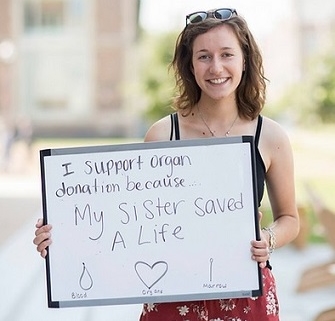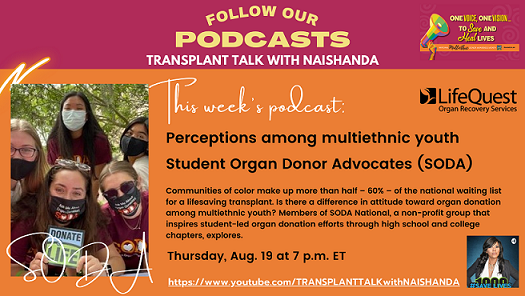Student Organ Donor Advocates (SODA)
August 2021:
August is National Multiethnic Donor Awareness Month! On Thursday, August 19 at 7 p.m. ET, LifeQuest and Transplant Talk with Naishanda will host a podcast featuring a panel of multiethnic college students who are members of Student Organ Donor Advocates. SODA is a national organization that forms student leadership teams to promote organ donation on high school and college campuses. There are 39 chapters nationwide, including two in the Florida Panhandle. LifeQuest is proud to mentor chapters at The University of Florida and Florida State University.
In this Q&A, SODA Founder and President Sara Miller shares why she started the nonprofit to honor her sister and inspire student advocacy.
To view the podcast, visit https://www.youtube.com/c/transplanttalkwithnaishanda.
Q: Why are you passionate about organ donation?
“The greatest tragedy of my life has fueled my passion to save lives. When I was 12-years-old, my older sister, Laura, passed away suddenly. My family decided to donate her liver, which saved a woman’s life in New York. The devastating loss of Laura, combined with the miracle of her saving a life, has motivated me to create a platform for students across the country to advocate for organ donation and save lives.”
Q: Why/when did you start SODA?
“As a first-semester freshman at Washington University in St. Louis, I founded SODA: Student Organ Donation Advocates. We were just one chapter at the time. Since graduating in 2017, I have overseen our expansion to almost 40 chapters nationwide. Our passion is removing barriers for students who want to get involved with organ donation advocacy, and we are so grateful to support many passionate student leaders nationwide.”
Q: Had your family ever talked about donation before your sister, Laura, shared the Gift of Life?
“My family had unfortunately never talked about organ donation before we were in the difficult position of deciding whether my sister would be an organ donor. I encourage you to have a conversation about organ donation with your family today, so that if something horrible does happen, you don’t have to make this decision during such a stressful time.”
Q: You have been quoted as saying the hospital is the worst place to discuss organ donation. What did you mean?
“As you know, hospitals can be stressful environments. That’s why I recommend having a conversation about organ donation in a comfortable setting, such as at the dinner table or on the phone with a loved one, as this avoids having to make a decision about organ donation in the hospital. My family made the decision to donate Laura’s organs in the hospital, and we are so glad we did, but we also wish we had discussed organ donation before such a tragic and stressful time.”
Q: How has organ donation affected you and your family?
“My family feels grateful for organ donation. While you might typically think about “organ donors” as giving, and “organ recipients” as receiving, my family feels we gained so much from Laura giving the gift of organ donation. We feel that she is able to live on in her organ recipient, and it has helped us make sense of an otherwise senseless loss.”
Q: What was it like meeting Laura’s liver recipient?
“My family jokes that meeting Laura’s liver recipient, Trish, was our Oprah moment without the cameras. Meeting Trish was a wonderful experience. She is warm and compassionate and feels deep gratitude for the gift of life. Additionally, she helps others in her day-to-day life as both a Special Education teacher and gym owner.”
Q: Is there a misconception about organ donation that you feel others need to be educated about?
“I wish everybody knew that people of all ages can make a difference. Whether you are young or old, anybody can be an organ donor and share the life-saving message of organ donation to help save lives.”
Q: Describe the perception of organ donation among today’s youth.
“Students are often eager to learn about new topics, explore different ideas, and to make a difference. We have found the students are a terrific audience to educate about organ donation, both because they often support the cause, and because they are open-minded about new ways to make a difference.”
Q: How/why do you believe students can impact the future of organ donation?
“There are tangible ways student leaders nationwide make a difference in the future of organ donation – in particular, students can help educate their peers about organ donation and register them as organ donors. But there are also intangible benefits, which we like to call ripple effects. The conversation that a student has with their teacher can lead to many subsequent conversations which can make meaningful impacts on people’s interest in supporting organ donation. It all starts with one conversation!”
Q: Do all SODA members have a donation connection?
“When I started SODA, I had thought that most students would have a personal connection to organ donation, like me. However, I have loved meeting student leaders nationwide, who each have a different reason for getting involved. For some, they want to be a transplant surgeon. For others, they heard a powerful presentation about organ donation in high school that inspired them to make a difference. Regardless of how students hear about organ donation, we encourage them to get involved and share the importance of organ donation with their peers.”
Q: What is your vision for SODA?
“When I started SODA back in 2014, my vision was that we could create a seamless and meaningful way for students to get involved by starting an organ donation advocacy chapter at their school. I’m excited that we have built that! Now, we’re working to make sure that all students, regardless of their ability to commit to starting a chapter, can get involved and share the importance of organ donation with their communities. I’ll tell you more about that in the next question!”
Q: How can students start a chapter or host an event?
“Whether you have a few hours to devote to organ donation advocacy right now, or a few hours each week to commit to the cause, we want to support your life-saving efforts!”
“At SODA, we have two primary ways to get involved:
1. Host an event: Only have a few hours here and there to advocate for organ and tissue donation? Hosting a SODA event is a quick and easy way to educate your peers and register them as organ donors.
2. Start a chapter: Looking to create a lasting legacy and dedicate a few hours each week to organ and tissue donation advocacy? Lead a SODA chapter on campus with a group of your peers and host events together.”
“Learn more and get started at sodanational.org/students.“








